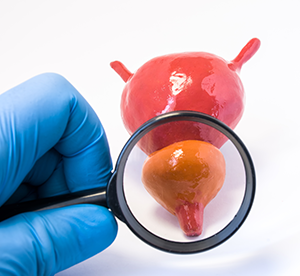

Benign prostatic hyperplasia (BPH) / Enlarged Prostate is a prevalent condition characterized by the non-cancerous enlargement of the prostate gland. The prostate gland, a vital part of the male reproductive system, surrounds the urethra and It produces a fluid that is part of semen and helps nourish and transport sperm. With age, the prostate gland naturally undergoes an enlargement process. In some cases, this enlargement can cause the prostate to squeeze the urethra, leading to various urinary symptoms and discomfort.
This condition affects a significant number of men, with estimates suggesting that over 40% of men in their 50s and more than 80% of men in their 70s and 80s have BPH. Although it is not a life-threatening condition, BPH can cause significant discomfort and affect the quality of life of those who suffer from it. BPH symptoms can significantly impact a man's quality of life. The disruptive nature of urinary symptoms can affect sleep patterns, daily activities, work productivity, and overall well-being. Seeking timely medical attention and appropriate treatment can help alleviate symptoms and improve quality of life.
Symptoms of Enlarged Prostate (BPH) can vary among individuals but commonly involve urinary problems. As the enlarged prostate gland puts pressure on the urethra, it can lead to the following symptoms:
These urinary symptoms can have a significant impact on daily life, causing discomfort, interrupting sleep patterns, and affecting overall quality of life. While BPH shares similar urinary symptoms with prostate cancer, BPH is a non-cancerous condition. If you experience any of these symptoms, it is advisable to consult a healthcare professional for proper evaluation and diagnosis. If left untreated, benign prostatic hyperplasia (BPH) / Enlarged Prostate can lead to worsening urinary symptoms, urinary retention, bladder stones, urinary tract infections (UTIs), bladder damage, kidney problems, and a decreased quality of life.
Benign prostatic hyperplasia (BPH) is primarily caused by age-related changes in the prostate gland. As men age, the balance of hormones in their bodies shifts, leading to an increase in the production of dihydrotestosterone (DHT), a hormone derived from testosterone. DHT stimulates the growth of prostate cells, resulting in the enlargement of the prostate gland. While age is the primary risk factor for developing BPH, other factors may contribute to its development or worsening of symptoms. These include:
Chronic Inflammation: Chronic inflammation of the prostate gland, known as prostatitis, has been associated with an increased risk of BPH. Inflammation can lead to tissue damage and alterations in the structure of the prostate, contributing to the development of BPH.
While these factors can increase the risk of developing Enlarged Prostate (BPH), the exact cause of the condition is not fully understood. Enlarged Prostate (BPH) is a multifactorial condition and individual cases may involve a combination of different factors including hormonal, genetic, and environmental factors that contribute to the development and progression of BPH. Regular prostate screenings and discussions with a healthcare professional can help assess your risk and provide appropriate management strategies.
Enlarged Prostate (BPH) is a common condition that can have a significant impact on a man's quality of life. However, with the range of treatment options available, including non-surgical and minimally invasive procedures, managing the symptoms of Enlarged Prostate (BPH) is possible. If you are experiencing any symptoms of Enlarged Prostate (BPH), it is important to speak with a urologist who can help you determine the best course of action for your individual needs. Don't let BPH hold you back from living life to the fullest. Contact us at MASSH today to schedule a consultation and take the first step towards a better quality of life.
At MASSH Hospital in Delhi, we specialize in the diagnosis and treatment of Benign Prostatic Hyperplasia (BPH), commonly known as an enlarged prostate. Our team of experienced urologists offers advanced treatments to manage symptoms, improve urinary function, and enhance quality of life. With personalized care and state-of-the-art technology, we provide the most effective solutions for Enlarged Prostate (BPH), ensuring comfort and optimal results. Visit us for expert consultation and comprehensive care tailored to your needs.
Enlarged Prostate (BPH) is a condition where the prostate gland grows larger, often causing urinary problems such as frequent urination, weak urine flow, and difficulty in starting or stopping urination. These symptoms can significantly affect a man’s quality of life.
Our experienced urologists provide a comprehensive approach to the diagnosis and treatment of Enlarged Prostate (BPH). We begin with a thorough evaluation, including advanced diagnostic tests, to understand the severity of the condition and customize a treatment plan suited to your needs. Depending on the symptoms and size of the prostate, treatment options may include medications, lifestyle changes, and minimally invasive procedures like Transurethral Resection of the Prostate (TURP) or laser treatments.
We prioritize patient comfort and safety. Our state-of-the-art facilities and experienced surgical team ensure that procedures are performed with precision, leading to faster recovery times and minimal discomfort. We also offer post-treatment care to monitor progress and ensure long-term relief from Enlarged Prostate (BPH) symptoms.
If you are experiencing symptoms of Enlarged Prostate (BPH) or would like expert advice, Visit MASSH Hospital, Delhi for a thorough consultation. Our team is committed to providing you with the highest quality care and helping you manage and treat enlarged prostate effectively.
Embark on a journey of exceptional healthcare guided by industry's true luminaries who consistently exceed
expectations and set new benchmarks for excellence in everything from cutting-edge innovations to personalized care.
MASSH Group of Hospitals is a trusted name in delivering advanced healthcare solutions with a network of premier super speciality hospitals, committed to providing ethical, compassionate, and innovative care. Our expanding network ensures that cutting-edge medical services are always within your reach.